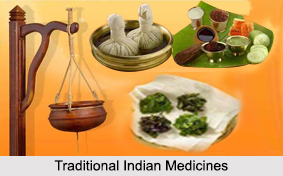 Traditional Indian Medicines are made from herbs or mixture of herbs either alone or combining it with minerals, metals and other ingredients. Traditional Indian Medicine reminds one of the ancient Indian health care systems popularly known as Ayurveda. Ayurveda is concerned with the protection of ‘Ayush’ which includes healthy living along with therapeutic measures that relate to physical, mental, social and spiritual harmony.
Traditional Indian Medicines are made from herbs or mixture of herbs either alone or combining it with minerals, metals and other ingredients. Traditional Indian Medicine reminds one of the ancient Indian health care systems popularly known as Ayurveda. Ayurveda is concerned with the protection of ‘Ayush’ which includes healthy living along with therapeutic measures that relate to physical, mental, social and spiritual harmony.Concept of Traditional Indian Medicine
The central concept of traditional Indian medicine is the theory that the good health can be maintained when there is a balance between the Tridoshas; Vata, Pitta and Kapha. Vata is the air principle necessary to mobilize the function of the nervous system. Pitta is the fire principle which uses bile to direct digestion and hence metabolism into the venous system. Kapha is the water principle which relates to mucous, lubrication and the carrier of nutrients into the arterial system.
Origin of Traditional Indian Medicine
The origin of this traditional Indian medicine, Ayurveda is stated to be a divine revelation of the ancient Indian creator Lord Brahma. This knowledge was directly passed to Daksha Prajapati in the form of ‘Shloka’ sung by Lord Brahma and this was then passed through a successive chain and ultimately to Lord Indra, the protector of Dharma. The first human exponent of Ayurveda was Bharadvaja, who learned it directly from Lord Indra. Bharadvaja in turn taught Ayurveda to a group of assembled sages, who then passed down different aspects of this knowledge to their students. Ayurveda was first described in text form by Agnivesha, in his book the ‘Agnivesha Tantra’. The book was later renamed by Charaka and came to be known as the ‘Charaka Samhita’.
For more, visit the link below: